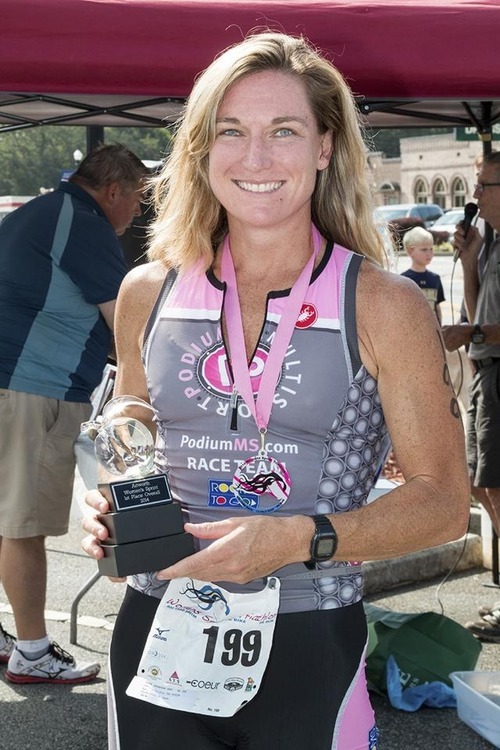By Abby Mowinski
I haven’t quite gotten to the place where I can outright call myself a runner, or even a triathlete for that matter, and I certainly have no right calling myself a cyclist — but I am a swimmer.
And, I must admit, there are a few aspects of being partially amphibious that parlay nicely into the sport of triathlon aside from the obvious “comfortable in the water” thing.
Advantages:
(1) We’re accustomed to two-a-days and morning practice. And training 6 days a week…year-round.
Swimmers come to the multi-sport table with a well-developed awareness of the time sacrifices it takes to develop a skill. Swimmers are not necessarily the most gifted athletes; I would imagine, if you polled a large group of swimmers, the majority would tell you that they are decent athletes who work really hard. Swimming well…swimming fast…swimming efficiently is all about technique and repetition. You don’t have to be a “natural”, you just have to commit.
(2) We’re mentally tough.
Face it, watching an old used band-aid dance in slow motion across a black tiled lane line for a period of two hours as your only change of scenery is pretty mind-numbing. Swimmers have to adapt to find a way to stay mentally engaged and focused, while asking all they can out of their bodies. It’s an individual sport masquerading as a team sport – and your best friend, or worst enemy, is right there in your head. Build your “fortress of solitude”, hone that laser focus, and you can push through the hard places and achieve what before seemed improbable, if not impossible.
(3) We have a greater lung volume.
I have absolutely zero scientific evidence to substantiate this claim. I do think, by virtue of breath control being an integral part of the sport, that swimmers, over time, improve the efficiency of their lungs – or, perhaps better put, use the full capacity of their lungs yielding better oxygenation. Likewise, I think this is one of the areas that athletes developing their swimming skills can really benefit to focus on. Practice taking full purposeful breaths, engaging your abdomen. I’m not saying to walk around the office breathing like Darth Vader, but perhaps go for a hike and fall into a steady breathing pattern. Or just think more critically about breathing on your runs or bikes – I believe it really will make a difference, not only in your swimming performance, but the other disciplines as well.
A young Abby starting her swimmers life and building lung volume.
On the flip side, there are disadvantages to having a background in swimming. (Disclaimer: these may only be truisms for me.)
(1) We’re not that accustomed to going fast.
Riding a bike scares the hell out of me. There is something altogether sick and unnatural about rocketing down a hill as fast as a car, thrust forward in aggressive aero position, looking at the pavement and your potenetial early demise without even being allowed to have your hands on the brakes. It’s really ridiculous in fact. Swimmers are accustomed to overuse injuries and the occasional jammed finger – that’s about it. And while the person hopping down the middle of your lane waving their arms in jean shorts and aquasocks may be ridiculously annoying, they’re not going to send you to the hospital or cut your season short. So, know in your hearts, that as much as you may fear the water and the mass start, there is a swimmer out there whose greatest fear is mounting that bike.
Note: Abby may not always like hurtling down hills on her bike, but she does it with skill and grace, and wins.
(2) We expect uniformity in timing.
In swimming, 25 yards is 25 yards…50 meters is 50 meters. Results are black and white. Yes, there are “slow” and “fast” pools based on water depth, gutter design, etc. – but, ultimately, the difference in time is subtle. Whereas, in the world of triathlon, every single aspect of the race comes with its own variables – the course itself, the time of year, the weather conditions that day, the performance of your equipment. It is a frameshift to accept that, race to race, one cannot readily compare times. So the lesson here? Don’t get caught up in your times, don’t obsess about breaking a certain time point as your only goal. I’m not saying ignore your splits, just focus instead on your performance that day, in that field of athletes – because that is the closest that you will get to comparing apples to apples. And, please remember, that one race is just that…one race on one day – it doesn’t define a year of training and commitment.
(3) We’re not used to all of this gear – or all of this expense.
There is so…much…gear. What does a swimmer need? A suit, a cap, and goggles. Just add water. What does a triathlete need? Alll of the above, plus a wetsuit, a helmet, a really expensive bike in addition to the one you already have, bike shoes, special pedals, a special water bottle, upgraded components, a special watch, a bike computer, a power meter, a trainer. You see where this is going and we haven’t even gotten out of T1. While all of this gear does affect performance to some degree, nothing replaces upgrading the most important piece of equipment…you.
All musings aside, as a swimmer, the one most important, most relevant piece of advice that I can give to those of you who consider yourselves “not swimmers” – join a Masters team. Least intimidating and smartest move possible. Did you read that? Least intimidating. Those of us that were “swimmers” are the minority at Masters practices…I promise. By joining a Masters team, you will gain invaluable insight and coaching on stroke technique and body position, gain confidence in the water, work on interval training, and have the camaraderie of a team. Face it, swimming can be a boring sport to train (reference…the band aid) and is much better shared with others.
U.S. Masters Swimming is a national organization that offers structured coached workouts at local pools all across the country. I encourage everyone who is not currently training with a coached program to check it out – you won’t regret it! See you at the pool!


 SWIM
SWIM
 BIKES
BIKES
 APPAREL
APPAREL
 NUTRITION
NUTRITION
 COMPONENTS
COMPONENTS
 ACCESSORIES
ACCESSORIES
 Podium Multisports Blog
Podium Multisports Blog











